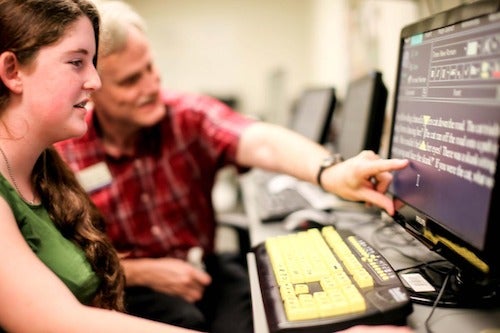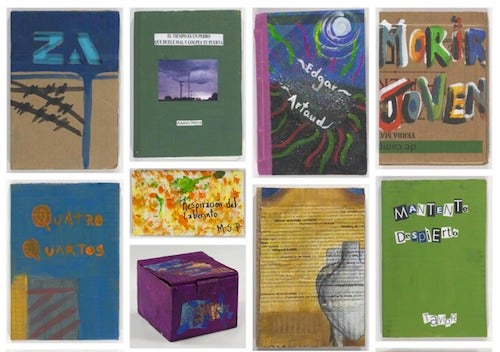Editor:
Brandon Sweet
University Communications
bulletin@uwaterloo.ca
Low Vision Month: offering services and focusing on research to help with vision loss

By Lauren Ward.
February is Low Vision Month, a month that brings awareness to any incurable visual impairment that can negatively impact everyday life and make regular activities difficult to do. This is why many of the top priorities at the School of Optometry and Vision Science (UWOVS) include providing services for patients with low vision and delving into research on conditions that lead to vision loss.
Visual impairment leading to low vision can be devastating. Low vision cannot be fixed with glasses, contact lenses, or other standard treatments like medicine and surgery. When it comes low vision, the use of vision assessments, vision aids, and counselling can help improve quality of life and maximize independence for those who are impaired.
The George and Judy Woo Centre for Sight Enhancement Low Vision Clinic is one such area where the School provides a comprehensive range of vision rehabilitation services. The Low Vision Clinic offers rehabilitation through assessments and specialty visual aids such as closed-circuit televisions, computer adaptations, and tools for daily living. Not only that, but the clinic also aids in accessing government programs and services and connecting you with groups serving the low vision population.
“There is hope for anyone confronted with an incurable eye condition. Implementing different tools and strategies really can allow you to continue doing the activities that you would like to do,” says Dr. Tammy Labreche, director of the George and Judy Woo Centre for Sight Enhancement.
Conditions that cause vision loss and treatments are one of the main focuses of research within UWOVS. One such treatment being looked at for macular degeneration is making great strides. This would be transcranial direct current stimulation (tDCS), a non-invasive, painless brain stimulation. Using direct electrical currents to stimulate the visual cortex, tDCS helps the brain use information it receives from the eye as efficiently as possible.
As Andrew Silva, postdoctoral fellow here in UWOVS stated in Waterloo News, “This finding is exciting because this is the first study to demonstrate brain stimulation in patients with macular degeneration had a positive impact on an important real-world skill like reading.”
Low vision does not allow you to see well enough, making it difficult to do regular activities such as reading, shopping, driving, or cooking. There are a variety of types of low vision with the most common types being:
- Central vision loss (where you are unable to see in the center of your vision)
- Peripheral vision loss (where you are unable to see out of the corners of your eyes)
- Night blindness (where you are unable to see in low light)
- Blurry or hazy vision
When it comes to low vision, it is dependent on the disease or condition that caused it. The usual suspects causing low vision include age-related macular degeneration (AMD), cataracts, diabetic retinopathy, and glaucoma.
If you or a loved on is suffering from low vision, you can connect and make an appointment with our Low Vision Clinic team.
Wetlands under threat

Thursday, February 2 marks World Wetlands Day, an international government agreement acknowledging the importance of wetlands and their ecological role in conserving our ecosystems.
“Wetlands are these climate change superheroes,” says Dr. Rebecca Rooney, a wetland ecologist and professor in the Department of Biology. “Wetlands are a portfolio of ecosystem services: including flood prevention, breaking down pesticides, storing large amounts of carbon, and provide habitat for more than 32 per cent of Ontario species at risk who rely on these wetlands to mitigate climate change.”
Canada is home to 25 per cent of the world’s wetlands. But according to Rooney, Canada has lost more than 60 per cent of our wetlands over the years. In agricultural areas, wetlands have been drained to make space for farming. While in urban and suburban areas, Canada has lost the majority of its wetlands due to them being drained for housing development.
Stormwater ponds are engineered solutions created to effectively replace wetlands across Ontario. However, these ponds only address some of the problems including flood prevention, but they need to provide the full portfolio of ecosystem services that wetlands provide.
The impact of Bill 23 on wetlands in Ontario
The More Homes Built Faster Act, formerly known as Bill 23, aims to address the housing crisis in Ontario through a series of changes to the Conservation Authorities Act, the Planning Act, the Municipal Act and other legislation that governs housing developments and nature conservation in the province.
This bill was passed on November 28, 2022. Associated with Bill 23 were 15 additional proposals on the Environmental Registry of Ontario, including changes to the boundaries of the Greenbelt, which rendered 15 parcels of land totalling 7,400 acres available to housing developments. The proposals posted to the Environmental Registry of Ontario also included changes to the Ontario Wetland Evaluation System, which is the instrument the provinces uses to determine whether a wetland gets classified as provincially significant.
“One of those proposals addresses the Ontario wetland evaluation system, where all wetlands in Ontario get assessed to determine if they are provincially significant,” says Rooney.
“If the wetland is provincially significant, then they are protected from being developed on. If they are not provincially significant, then they may be subject to development. Unfortunately, the changes that are being proposed to the Ontario wetland evaluation system will dramatically undermine its efficacy and endanger wetlands across Ontario," says Rooney.
Rooney explains how the Ministry of Natural Resources and Forestry currently provides training for those who manage the Ontario wetland evaluation system. But the proposed changes will transfer the responsibility to all municipalities, who may need more proper resources and funding to properly maintain the Ontario wetland evaluation system and in turn, little pockets of wetlands will be evaluated independently.
“There is a huge amount of scientific evidence that connects these pockets of wetlands into a whole integrated network,” says Rooney. “If you start chipping away at the wetlands and you destroy one piece of it, the whole network is going to suffer under the current proposals.”
Rooney encourages people to act by learning more about the Act and its impact on Canada’s wetlands. While housing continues to be a crisis in Ontario, Rooney emphasizes other different ways we can approach housing developments with more affordable and sustainable solutions so we can protect our wetlands and their crucial role in conserving our ecosystems.
Rebecca Rooney appeared on the Beyond the Bulletin podcast to discuss the value of wetlands, the actions she is taking to protect them and the recent passing of Bill 23.
CEE hosts Black History Month panel discussion

A message from Co-operative and Experiential Education (CEE).
This February, Co-operative and Experiential Education (CEE) will reflect upon, celebrate and dedicate time to the Black experience in the workplace. The unit is hosting the ‘Elevating Black Excellence in the Workplace’ panel discussion on Wednesday, February 22, 2023. The virtual event will explore:
- Real stories about barriers and opportunities for the future;
- Tactics employers are using to highlight, create opportunities, and foster belonging for Black talent; and
- Ways we can better future-proof Black co-op students.
Speakers include Norah McRae, Associate Provost, Co-operative and Experiential Education; Christopher Taylor, Associate Vice-President, Equity, Diversity, Inclusion, and Anti-racism; Aileen Agada, BeBlended founder; Trevor Charles, Professor and Director, Waterloo Centre for Microbial Research and Shauna-Kay Jones, Motify founder. Register today for this free virtual event.
Velocity appoints Director of Incubator and Director of Health

A message from Velocity.
Velocity welcomes Director of Velocity Incubator Sarrah Lal and Director of Velocity Health Moazam Khan to its leadership team as it continues to evolve to support the next generation of high-impact entrepreneurs.
Cultivating persistently enterprising people for real-world impact

Before Velocity, Sarrah Lal spent five years as a faculty member at McMaster University’s medical school. There she used highly collaborative learner-centered approaches to create case-based training experiences for entrepreneurship, intrapreneurship, and leadership education, working with over 150 students per year across three programs.
With a background in science, biomedical engineering, law, and business, over her career she has nurtured her own entrepreneurial mindset through being “out in the wild”: working directly with founders and later co-founding a health start-up in breath-based diagnostics.
As Director of the Velocity Incubator, Lal will leverage her insights into entrepreneur and organizational development to clarify and grow Velocity’s impact on the Canadian startup ecosystem.
“Make no mistake, Velocity is world-class,” Lal said. “With that comes a responsibility to always keep moving the needle on what it means to accelerate the progress of entrepreneurs. And yes, it also means raising the standard on what we mean by diversity and inclusion in the entrepreneurship community.”
First on her list is to increase the entrepreneurship community’s representation of female-identifying and non-binary, 2SLGBTQ+, and culturally diverse founders. A close second is ensuring that the Velocity community has access to world-class training, resources, and connections from the time they apply to Velocity to when they launch and join the illustrious community of Velocity Alumni.
“We are interested in working with all persistently enterprising people who have the ambition, insights, and drive to create impactful ventures,” she added. “Likewise, we are also a group of persistently enterprising people developing leading approaches to maximize start-up survival rates and successes. If that sounds a bit like you, we invite you to apply to join our community.”
Building a platform to close the innovation to commercialization gap

With deep roots in innovation ecosystems across the globe, Moazam Khan (BSc. ‘16, MBET ‘17) joined Velocity staff as business adviser to Velocity’s portfolio of health tech startups prior to filling the Director of Velocity Health role.
Khan is a serial entrepreneur with a background in medical science, business and technology and has experience in launching and scaling companies, including Velocity Alumni Curiato.
Khan said health tech startups are confronted with obstacles different from their counterparts in other fields of research and development, creating a huge gap between innovation and commercialization.
“This is a big problem in Canada,” Khan said. “Health tech startup validation comes from clinical trials and pilots which is a big challenge because early-stage founders don’t have the necessary funding to conduct trials but if they don’t have the validation, they can’t raise venture capital funding.”
Khan’s vision is to break through this catch-22 by developing a platform for clinical trial support and key technical and funding advisers, including hospitals, entrepreneurial physicians, Velocity alumni and investors.
“We are setting our eyes on the global stage to foster one of the world’s largest health tech commercialization platforms,” Khan said. “I returned to Velocity to help scale and grow the next generation of health tech. This region is special with its abundance of health innovation and through this network, health tech startups can work on the next big idea and scale.”
Since launching in 2008, Velocity companies have raised over $4.3B USD in venture capital and have a collective enterprise value of over $26B USD. The list of full-time Velocity companies will soar from 70 to over 100 when Velocity operations move to the Innovation Arena facility in late 2023.
Read how Velocity is building with optimism.
Takin' it to the streets and other notable notes

Cartonera examples from the collection of the University of Wisconsin-Madison.
The Dana Porter Library will be hosting Takin’ It To The Streets: La Cartonera Exhibit this month. "Professor Tara Cooper’s Fine Arts 204 class have created their own la cartonera artist books, which will be on display in the Dana Porter Library lobby until February 13," says a note from the Library. "Join us in the Dana Porter Library lobby on February 2 from 2:00 p.m. to 4 p.m. to celebrate the opening of the exhibit and try your hand at creating your own artist's book!"
The exhibit runs from February 2 to February 13.
The Registrar's Office reports that the 2023-2024 Undergraduate Studies Academic Calendar is now available online. Previous Undergraduate Calendars are available in the List of Undergraduate Studies Archived Calendars section.
Students are also being invited to select their 2023 spring term courses, as the course selection period opened on January 30 and will run until Tuesday, February 7 at 11:59 p.m.
Link of the day
When and Where to get support
Students can visit the Student Success Office online for supports including academic development, international student resources, immigration consulting, leadership development, exchange and study abroad, and opportunities to get involved.
Instructors looking for targeted support for developing online components for blended learning courses, transitioning remote to fully online courses, revising current online courses, and more please visit Agile Development | Centre for Extended Learning | University of Waterloo (uwaterloo.ca).
Faculty, staff, post-doc and graduate student instructors can find upcoming teaching and learning workshops, self-directed modules and recordings of previous events on Centre for Teaching Excellence Workshops and Events page.
Instructors can access the EdTech Hub to find support on Waterloo’s centrally supported EdTech tools. The Hub is supported by members of IST’s Instructional Technologies and Media Services, Centre for Teaching Excellence, Centre for Extended Learning and subject matter experts from other campus areas.
Supports are available for employees returning to campus. Visit IST’s Hybrid Work and Technology guidelines and workplace protocols to assist with the transition.
Students with permanent, temporary and suspected disabilities and disabling conditions (medical conditions, injuries, or trauma from discrimination, violence, or oppression) can register with AccessAbility Services for academic accommodations (classroom accommodations, testing accommodations, milestone accommodations).
Instructors can visit AccessAbility Services' Faculty and Staff web page for information about the Instructor/Faculty role in the accommodation process. Instructors/Faculty members are legally required to accommodate students with disabilities. AccessAbility Services (AAS) is here to help you understand your obligations, and to offer services and resources to help you facilitate accommodations.
Did you know that the Writing and Communication Centre offers many in-person and virtual services to support you with any writing or communication project? This term we've added The Write Spot: a new student space in South Campus hall, complete with bookable workspaces, drop-ins with our peer tutors, and free coffee and tea. We also have one-to-one appointments with our writing and communication advisors and peer tutors, email tutoring for grads and undergrads, drop-ins at Dana Porter Library, online workshops, writing groups, English conversation practice, and even custom in-class workshops. For any communication project, the Writing and Communication Centre is here to support you.
Research Ethics: Find yourself with an ethical question, unsure if your work requires an ethics review, or need advice about putting together a research ethics application? Reach out to one of our friendly staff by booking a consultation or email us with your questions.
Co-op students can get help finding a job and find supports to successfully work remotely, develop new skills, access wellness and career information, and contact a co-op or career advisor.
The Centre for Career Action (CCA) has services and programs to support undergrads, grad students, postdocs, alumni, and employees in figuring out what they value, what they’re good at, and how to access meaningful work, co-op, volunteer, or graduate/professional school opportunities. Questions about CCA's services? Live chat, call 519-888-4047, or stop by our front desk in the Tatham Centre 8:30 a.m. to 4:30 p.m., Monday to Friday.
Drop-in to in-person Warrior Study Halls on Thursdays from 5:00 p.m. to 6:30 p.m. in DC and DP. Join a Peer Success Coach to set goals and work independently or in groups each week.
Renison's English Language Institute continues to offer virtual events and workshops to help students practice their English language skills.
If you feel overwhelmed or anxious and need to talk to somebody, please contact the University’s Campus Wellness services, either Health Services or Counselling Services. You can also contact the University's Centre for Mental Health Research and Treatment. Good2Talk is a post-secondary student helpline available to all students.
The Library is here to help, both in person and online. Our spaces are open for access to book stacks, study spaces, computers/printers, and the IST Help Desk. For in-depth support, meet one-to-one with Librarians, Special Collections & Archives and Geospatial Centre staff. Visit the Library’s home page to access our online resources for anywhere, anytime learning and research.
The Faculty Association of the University of Waterloo (FAUW) continues to advocate for its members. Check out the FAUW blog for more information.
The University of Waterloo Staff Association (UWSA) continues to advocate for its members. Check out the UWSA blog for more information.
The Office of Equity, Diversity, Inclusion & Anti-Racism (EDI-R) works with students, faculty and staff across campus to advance equity and Anti-racism through evidence-based policies, practices and programs. If you have a concern related to Anti-racism and/or equity, please complete our intake form.
The Sexual Violence Prevention and Response Office (SVPRO) supports all members of the University of Waterloo campus community who have experienced, or been impacted, by sexual violence. This includes all students, staff, faculty and visitors on the main campus, the satellite campuses, and at the affiliated and federated Waterloo Institutes and Colleges. For support, email: svpro@uwaterloo.ca or visit the SVPRO website.
The Office of Indigenous Relations is a central hub that provides guidance, support, and resources to all Indigenous and non-Indigenous campus community members and oversees the University's Indigenization strategy.
The Waterloo Indigenous Student Centre, based at United College, provides support and resources for Indigenous students, and educational outreach programs for the broader community, including lectures, and events.
WUSA supports for students:
Peer support - MATES, Glow Centre, RAISE, Women’s Centre - Click on one of the links to book an appointment either in person or online for the term.
Food Support Service food hampers are currently available from the Turnkey Desk 24/7 in the Student Life Centre. Drop-off locations are also open again in SLC, DC, DP, SCH, and all residences.
Co-op Connection all available online.
Centre for Academic Policy Support - CAPS is here to assist Waterloo undergraduates throughout their experience in navigating academic policy in the instances of filing petitions, grievances and appeals. Please contact them at caps@wusa.ca.
WUSA Student Legal Protection Program - Seeking legal counsel can be intimidating, especially if it’s your first time facing a legal issue. The legal assistance helpline provides quick access to legal advice in any area of law, including criminal. Just call 1-833-202-4571.
Empower Me is a confidential mental health and wellness service that connects students with qualified counsellors 24/7. They can be reached at 1-833-628-5589.
GSA-UW supports for graduate students:
The Graduate Student Association (GSA-UW) supports students’ academic and social experience and promotes their well-being.
Advising and Support - The GSA advises graduate students experiencing challenges and can help with navigating university policies & filing a grievance, appeal, or petition.
Mental Health covered by the Health Plan - The GSA Health Plan now has an 80 per cent coverage rate (up to $800/year) for Mental Health Practitioners. Your plan includes coverage for psychologists, registered social workers, psychotherapists, and clinical counselors.
Dental Care - The GSA Dental Plan covers 60 to 70 per cent of your dental costs and by visiting dental professionals who are members of the Studentcare Networks, you can receive an additional 20 to 30 per cent coverage.
Student Legal Protection Program - Your GSA fees give you access to unlimited legal advice, accessible via a toll-free helpline: +1-833-202-4571. This advice covers topics including housing disputes, employment disputes, and disputes with an academic institution.
The Graduate House: Open Monday to Tuesday 11:30 a.m. to 7:00 p.m. and Wednesday to Friday 11:30 a.m. to 9:00 p.m. We’re open to all students, faculty, staff, and community members. The Graduate House is a community space run by the GSA-UW. We’re adding new items to the menu. Graduate students who paid their fees can get discounts and free coffee.
When and Where
Warriors Game Day Tickets and Season Passes, on sale now. Cheer on your Warriors W/M Basketball, Football W/M Hockey and W/M Volleyball teams at home during the 2022-23 season. Purchase today.
Fitness and Personal Training - Registrations opened January 5 this winter with Personal Training and Small Group Training as well as a Free Warrior Workout Program.
Student Health Pharmacy in the basement of the Student Life Centre is now offering Covid booster shots (Pfizer and Moderna) and flu shots. Call 519-746-4500 or extension 33784 for an appointment. Walk-ins always welcome.
BE-STEMM 2023 Virtual Conference, Wednesday, February 1 to Saturday, February 4, online.
UWAG presents Mobile Sweat, Thursday, February 2 and Friday, February 3, 12 noon to 5:00 p.m., East Campus Hall adjacent to UWAG entrance across from Parking Lot B.
FASS presents "The Other Side of the Story," Thursday, February 2, Friday, February 3, and Saturday, February 4, 8:00 p.m., Theatre of the Arts. Tickets are pay what you can Thursday, $12 Friday and Saturday.
NEW - Takin’ It To The Streets: La Cartonera Exhibit launch, Thursday, February 2, 2:00 p.m. to 4:00 p.m., Dana Porter Library lobby. Exhibit runs from February 2 to February 13.
NEW - The Power of Misfitting: Disrupting Sinner, Saint, and Super Crip Controlling Images, Thursday, February 2, 7:30 p.m., Conrad Grebel Great Hall.
Quantum Today: Metamaterials for Broadband Light Absorption, with Professor Michael Reimer from the Institute for Quantum Computing and the Department of Electrical & Computer Engineering, Friday, February 3, 12:00 noon, live on YouTube.
NEW - Knowledge Integration Seminar: Life after KI, Friday, February 3, 2:30 p.m. to 4:00 p.m., EV3 1408.
Warrior Volleyball vs. Brock,Saturday, February 4, (W) 6:00 p.m., (M) 8:00 p.m., PAC. Employee Day (free tickets sponsored by Hilton. Email WarriorsTickets@uwaterloo.ca for free coupon code), Donor Appreciation Day. Buy your tickets today.